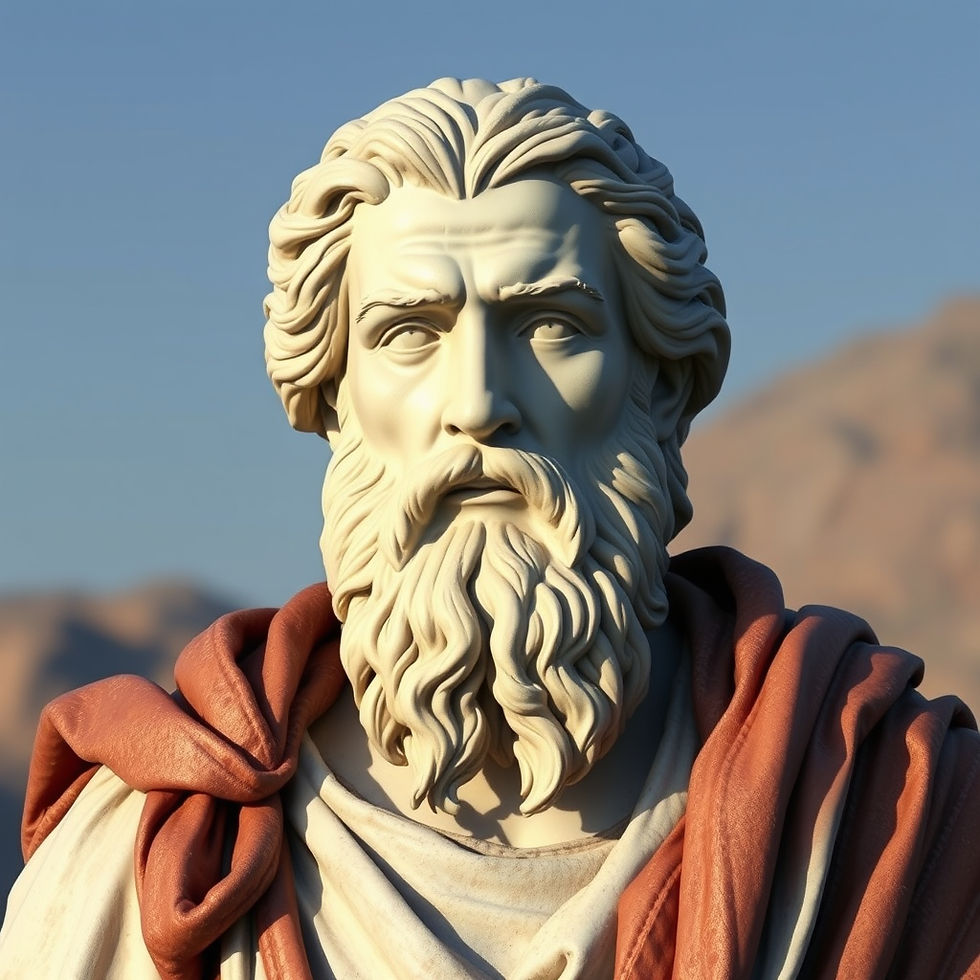The Epicurean Dilemma, and the Destruction of Traditional Western Theism
- Alex Belle
- Jul 16
- 4 min read

The Epicurean dilemma, which is often attributed to the ancient Greek philosopher Epicurus (341–270 BCE), remains one of the most enduring challenges when it comes to the philosophy of religion. The dilemma questions the logical compatibility of an omnipotent, omniscient, and omnibenevolent God with the existence of evil, and has been a thorn in the side of Christians for thousands of years.
"Is God willing to prevent evil, but not able? Then he is not omnipotent.Is he able, but not willing? Then he is malevolent.Is he both able and willing? Then whence cometh evil?Is he neither able nor willing? Then why call him God?"
Tghroughout the centuries of theological and philosophical debate, scholars have argued that the Epicurean dilemma exposes a fundamental and unresolved contradiction within classical theism.
1. Logical Inconsistency in Theism
The Epicurean dilemma has been formalised into what philosophers call the logical problem of evil. This argument holds that the existence of evil is logically incompatible with the simultaneous existence of a God who is all-powerful (omnipotent), all-knowing (omniscient), and all-good (omnibenevolent) (Mackie, 1955).
J. L. Mackie famously argued that these attributes, when combined with the observable existence of evil, create a logical contradiction. If God knows about evil, is able to prevent it, and wants to prevent it, then evil should not exist. The persistence of suffering, such as natural disasters, moral atrocities, and systemic injustice, suggests either a limitation in God's power, knowledge, or goodness.
This logical formulation presents a deductive argument that leaves no room for ambiguity—if the premises are true, the conclusion necessarily follows. Thus, unless one denies one of God's classical attributes, the dilemma stands.
2. The Failure of the Free Will Defence
In response to the dilemma, some theologians propose the free will defence, which argues that God allows evil to exist so that humans can have genuine freedom to choose good or evil (Plantinga, 1974). This response attempts to preserve God's goodness and omnipotence by suggesting that moral evil is a necessary consequence of granting free will.
However, critics point out that this defence fails to account for natural evil, such as earthquakes, tsunamis, and diseases, which are not caused by human choices. Furthermore, even in the realm of moral evil, the scale and intensity of suffering (e.g., genocide, child abuse) seem disproportionate and unnecessary for the development of moral agency (Rowe, 1979).
Moreover, omnipotence should include the power to create a world where free will exists, but people always freely choose good, an idea some philosophers argue is logically possible but not actualised (Martin, 1990).
3. The Evidential Problem of Evil
Building on the logical problem, the evidential problem of evil (Rowe, 1979) takes a probabilistic approach. It does not claim a logical contradiction but argues that the sheer amount and severity of apparently gratuitous suffering make the existence of an all-good, all-powerful God highly implausible.
Consider the death of a fawn in a forest fire, a case with no discernible moral or spiritual value. As William Rowe argues, such instances of gratuitous evil seem to lack any greater purpose, undermining the idea that all evil is part of a divine plan.
This argument is strengthened by empirical evidence: historical genocides, pandemics, and natural disasters seem to occur without any consistent redemptive outcome.
4. Theodicies Fail to Reconcile Omnibenevolence and Suffering
Theological attempts to justify God's allowance of evil, called theodicies, often struggle to avoid sounding ad hoc or morally dubious. For instance:
Soul-making theodicy (Hick, 1966) posits that suffering is necessary for spiritual growth. Yet many victims (e.g., children who die in infancy or the mentally disabled) are incapable of this process.
Greater good theodicies suggest that evil leads to greater goods. Critics argue this implies a utilitarian calculus unworthy of a benevolent, and all-powerful deity (Draper, 1989).
Mysterious ways theodicy suggests that God's purposes are beyond human understanding, effectively rendering the concept of divine goodness meaningless, since it cannot be assessed by any human standard.
These responses often raise more questions than they answer, failing to resolve the tension the Epicurean dilemma exposes.
5. Incoherence of Divine Attributes
Some philosophers suggest that the root problem is not evil itself, but the incoherent conception of God. The traditional attributes of omnipotence, omniscience, and omnibenevolence may be logically incompatible when taken together (Martin, 1990; Oppy, 2013).
For instance, omnipotence that includes the ability to override free will undermines moral responsibility. Meanwhile, omniscience (knowing the future) challenges the idea of genuine freedom. Attempting to reconcile these attributes often leads to paradoxes, further reinforcing the idea that the problem of evil is insoluble within classical theism.
Conclusion: An Unsolved Problem at the Core of Theism
Despite centuries of philosophical effort, the Epicurean dilemma remains a central and unresolved problem in the philosophy of religion. While theists have offered numerous defences and theodicies, none have achieved widespread academic consensus as definitive solutions.
From a secular academic standpoint, the persistence of this dilemma suggests that traditional conceptions of God, at least as defined by classical theism, may be internally incoherent or empirically implausible. The challenge it poses is not simply theological; it is philosophical, logical, and moral in nature.
Until the internal tensions between divine attributes and the observable reality of evil are meaningfully resolved, the Epicurean dilemma will continue to cast a long shadow over the intellectual credibility of traditional western theistic belief.
References
Draper, P. (1989). “Pain and Pleasure: An Evidential Problem for Theists.” Noûs, 23(3), 331–350.
Hick, J. (1966). Evil and the God of Love. Harper & Row.
Mackie, J. L. (1955). “Evil and Omnipotence.” Mind, 64(254), 200–212.
Martin, M. (1990). Atheism: A Philosophical Justification. Temple University Press.
Oppy, G. (2013). The Best Argument Against God. Palgrave Macmillan.
Plantinga, A. (1974). God, Freedom, and Evil. Eerdmans.
Rowe, W. L. (1979). “The Problem of Evil and Some Varieties of Atheism.” American Philosophical Quarterly, 16(4), 335–341.





Comments